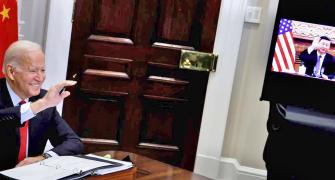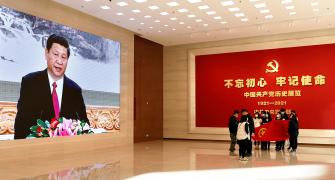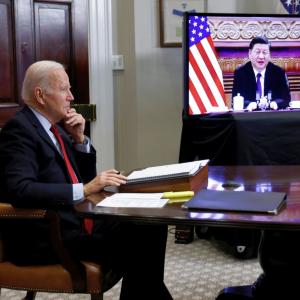United States President Joe Biden discussed with his Chinese counterpart Xi Jinping the importance of a 'free and open' Indo-Pacific, and communicated Washington's continued determination to uphold its commitments in the region, including the importance of freedom of navigation and safe overflight to the region's prosperity, the White House said on Tuesday.

During his much-anticipated virtual summit with Xi that lasted for about three and a half hours, President Biden welcomed the opportunity to speak candidly and straightforwardly to President Xi about America's intentions and priorities across a range of issues.
President Biden underscored that the United States will 'continue to stand up for its interests and values and, together with our allies and partners, ensure the rules of the road for the 21st century advance an international system that is free, open, and fair', the White House said in a readout of the meeting.
He also discussed the importance of a free and open Indo-Pacific, and communicated the continued determination of the United States to uphold its commitments in the region.
President Biden reiterated the importance of freedom of navigation and safe overflight to the region's prosperity, the statement said, amidst the Chinese military flexing its muscles in the strategically vital Indo-Pacific region.
Beijing claims almost all of the 1.3 million square mile South China Sea, through which trillions of dollars of international trade pass each year.
China has been building military bases on artificial islands in the region also claimed by Brunei, Malaysia, the Philippines, Taiwan and Vietnam.
China has impeded commercial activity like fishing or mineral exploration by countries like Vietnam and the Philippines, claiming that the ownership of territory belonged to China for hundreds of years.
Over the last five years China has rapidly built artificial islands housing significant military infrastructure on what had been low-lying reefs.
The United States has criticised China for militarising the islands by constructing long runways used by jet fighters and deploying anti-aircraft missiles.
The US insists that freedom of navigation has to be maintained in the South China Sea and has been sending military flights, naval patrols and training missions around the strategically vital region.
The Biden-Xi summit took place two months after the US, the United Kingdom and Australia announced a historic security pact in the Asia-Pacific, in what's seen as an effort to counter China.
The pact will let Australia build nuclear-powered submarines for the first time, using technology provided by the US.
China has condemned the Aukus pact as 'extremely irresponsible'.
Prior to the formation of the Aukus alliance, President Biden declared in March that the US is 'committed to a free, open, secure and prosperous Indo-Pacific region' in a rare op-ed penned with the leaders of India, Australia and Japan.
The alliance said it is trying to 'ensure that the Indo-Pacific is accessible and dynamic, governed by international law and bedrock principles such as freedom of navigation and peaceful resolution of disputes, and that all countries are able to make their own political choices, free from coercion'.
While not a formal military alliance like NATO, the Quad, or Quadrilateral Security Dialogue, is seen by some as a potential counterweight to growing Chinese influence and aggression in the Asia-Pacific region. The Quad has been denounced by Beijing as an anti-China bloc.
During the virtual summit, President Biden also underscored the importance of managing strategic risks, the White House said.
He noted the need for common-sense guardrails to ensure that competition does not veer into conflict and to keep lines of communication open, it said.
Meanwhile, the Chinese Foreign Ministry said that President Xi had thorough and in-depth communication and exchanges with Biden on issues of strategic, overarching and fundamental importance shaping the development of China-US relations and on important issues of mutual interest.
Xi highlighted China's commitment to peace, development, equity, justice, democracy and freedom, which are common values of humanity, it said.
"Drawing ideological lines or dividing the world into different camps or rival groups will only make the world suffer. The bitter lessons of the Cold War are still fresh in memory. We hope that the US side can meet its word of not seeking a 'new Cold War' with concrete actions," Xi told Biden, in an apparent reference to the formation of the Aukus security alliance and the Quad grouping.
President Xi pointed out that China and the US need to uphold the international system with the United Nations at its core, the international order underpinned by international law, and the basic norms governing international relations based on the purposes and principles of the UN Charter.
Multilateralism without China-US cooperation is incomplete, the Chinese foreign ministry quoted Xi as saying during the summit.










